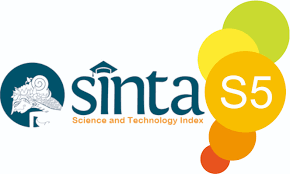Peran Pemerintah dalam Pengembangan Teluk Berdiri sebagai Objek Ekowisata di Kabupaten Kuburaya Kalimantan Barat
 Abstract views: 497
,
Abstract views: 497
,
 PDF downloads: 505
PDF downloads: 505
Abstract
This study aims to determine the role of government in the development of the Teluk Berdiri ecotourism as well as to determine the efforts that can be made to develop the ecotourism. The research method used in this research is descriptive qualitative method with the aim to make a description, a systematic, factual and accurate description of the facts investigated. The instrument used was a survey sheet and interview guidelines. The data analysis technique uses triaggulation technique, which is a technique for checking the validity of data that utilizes something different outside the data for the need to check the comparison of the same data from other sources. The results showed that the interest of tourists is still a local tourist, this is due to a number of factors such as inadequate facilities and infrastructure, such as lack of accessibility, lack of promotion, and others. The role of the government is currently trying to provide support, one of which is improving road access to the tour. Furthermore, efforts that can be made by the government are establishing cooperation with the local community for the construction of facilities and infrastructure, improving accessibility and promoting local wisdom and traditions to attract visitors. The development of environment-based tourism or ecotourism can be a guide in making use of the tourism sector and can be used as an attraction of an area to increase regional income (PAD).
Downloads
References
Adiyoso, W. 2009. Menggugat Perencanaan Partisipatif dalam Pemberdayaan Masyarakat. Jakarta: ITS Press.
Dewi, Made Heny Urmila, dkk. 2013. Pengembangan Desa Wisata Berbasis Partisipasi Masyarakat Lokal di Desa Wisata Jatiluwih Tabanan, Bali. Kawistara,Vol.3,No.2https://journal.ugm.ac.id/kawistara/article/download/3976/3251
Pratomo, M. Bayu dan Abdul Sadad. 2016. Upaya Pengembangan Objek Wisata di Kota Padang. JOM FISIP VOL.3.No.2.https://media.neliti.com/media/publications/206617-upaya pengembangan-objek-wisata-di-kota.pdf
Randolph, J. 2004. Environmental Land Use Planning and Management. Washington. D.C.: Island Press.
Sanoff, H. 2000. Community Participation Methods in Design and Planning. Brisbane : John Wiley & Sons, Inc.
Sugiyono. (2016). Metode Penelitian. Bandung: Alfabeta
Timothy, D. J. 1999. Participatory Planning a View of Tourism in Indonesia dalam Annals of Research, Vol 26, No.2.
Wibowo, Wahyu. 2014. Analisis Internal dan Eksternal (IE) Matrik dalam Strategi Pengembangan Wana Wisata Grajagan. Jurnal Ekonomi Bisnis Nomor 2.http://fe.um.ac.id/wpcontent/uploads/2009/10/8.-Wahyu.pdf
Copyright (c) 2020 Edutourism Journal Of Tourism Research

This work is licensed under a Creative Commons Attribution-ShareAlike 4.0 International License.
Authors who publish with this journal agree to the following terms:
- The author (s) keeps copyright on any article.
- The author grants the journal, right of first publication with the work simultaneously licensed under a Creative Commons Attribution License that allows others to share the work with an acknowledgement of the work’s authorship and initial publication in this journal.
- Authors can enter separate, additional contractual arrangements for the non-exclusive distribution of the journal’s published version of the work (e.g., post it to an institutional repository or publish it in a book), with an acknowledgement of its initial publication in this journal.
- Authors are permitted and encouraged to post their work online (e.g., in institutional repositories or on their website) prior to and during the submission process, as it can lead to productive exchanges, as well as earlier and greater citation of published work.
- We distributed the article, and any associated published material under the Creative Commons Attribution-Share alike 4.0 International License




